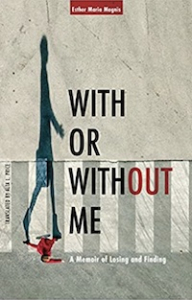Pivotal Moments by Kathryn Sadakierski

With or Without Me:
A Memoir of Losing and Finding
By Esther Maria Magnis
Plough Publishing, 2022
$17.99 201 pp.
Poppies, the most vibrant you can imagine, and a gash on the leg. This is how Esther Maria Magnis’s With or Without Me: A Memoir of Losing and Finding begins, with a juxtaposition of beauty and pain that cuts through. She remembers falling off of her bike as a child, thorns from bushes nicking her, but being unfazed, focused only on her quest to collect the brilliant poppies she’s seen in a field by the road. Leaves fall away on the way home, and when she finally puts the flowers in a vase, they don’t seem to be as bright as they’d been outside in the sun—but she doesn’t give up, always trying to preserve what’s blossomed.
So, too, in her memoir, does Magnis strive to recapture the color of her past memories, the ones that have so deeply shaped her spiritual faith. Through all the beauty and pain, devastating losses and inextinguishable love, she finds her way to Catholicism.
Readers follow Magnis as she comes of age in Germany at the end of the 20th century, accompanying her through turbulent years of change as the church redefines itself, broadening ecumenical efforts, casting nets ever wider, and encouraging youth to become involved in evangelizing. As Magnis writes, “Even the images hanging in the lobby of our little church looked exactly like the ones from UNESCO.” Amidst these global events, however, is all that is unfolding at home, with people left wondering how to find their place in a shifting landscape at the cusp of the new millennium. Magnis joins in their search, navigating complexities as the child of a Protestant father and Catholic mother, seeking to define herself and her beliefs while grappling with monumental changes in her own life and facing the terminal cancer diagnoses of her father and brother. In her quest to find God, Magnis ultimately finds herself.
Broken into three prismatic sections (red, white, and black), With or Without Me is a palette ranging across the canvas of Magnis’s life. Each color comes to signify a different point in her faith journey: the blazing intensity of youth with its first discoveries, to the colorless numbness of mourning, finally segueing into the depths of understanding, nuanced shades of knowing that come with time and healing—a sense of greater certainty, like words etched in ink rather than pencil that would only fade or be erased.
Threading all these hues together is the question of faith and of how to keep it, despite all the suffering in the world. There are no easy answers; the paradox is wrestled and wrangled with. Faith is like a piece of quartz that Magnis turns over in her palm, examining all its angles, the sharp edges and the shine. This lends With or Without Me a thoughtful and introspective quality, contemplative without being meandering, as Magnis relates the pivotal moments in her faith journey with vivid clarity and poetic flourishes that bring each scene captivatingly to life, like snapshots in a film. She deftly balances the transcendent and immanent as she recounts her walk towards God, yet never reducing her discussion of faith to abstractions:
The sea. All the sunrises of my life. All the mornings with a fresh blanket of snow. All the free, mysterious moments of grace, in all the varied ways I’ve experienced it—all those tender caresses from God—they aren’t mere sounds in a noisy world, I think . . . No, the Word was made flesh . . . All you can do is get down on your knees before it.
With or Without Me is rich with layers of poignant meaning. Its literary merit is undeniable, woven throughout with deeply symbolic motifs that lend it an almost biblical quality, the kind that bares truth down to its core. This makes the author’s faith feel strikingly tangible, never distant. Well-chosen sensory details allow for great emotional impact, placing the reader in the center of the action so they feel they are a part of it—just as Magnis’s earliest experience of God’s presence in nature makes her feel that, amidst the magnitude of creation, she is a “part of this whole.” Her voice is strongest when she reflects on the various ways in which she has heard God speak through the natural world:
The sound of the waves didn’t soften, but seemed to take another direction. Their whoosh was no longer toward me, to my little place on top of the rock, but rather outward into the distance. The rocks and the sea, the glimmer on the water’s surface, the stars and everything behind me—all of this lay at the feet of what was bearing down from the new depth of sky.
Some of the book’s most moving moments occur when Magnis underscores the power of prayer. We see what it means for Christians to come together and unify in their common suffering. Gathering to pray allows a greater faith, a greater love, to take root: first, when Magnis works through fears for her father when she learns of his cancer, and then later when her brother, Johannes, is met with his own cancer diagnosis. The depths of familial love ultimately reflect God’s love:
You no longer needed a loving gaze to be able to really see him. I had always loved Johannes. But the flame that love sparks was no longer just a brief flicker, a momentary, passing thing. It was now present and visible all the time. Love was there even in the silent gaps between our words . . . a simple, constant chord underlying it all—a love that said, “I’m here,” and took away all fear.
Magnis does not shy away from writing about darkness as she recollects her transitions through stages of grief. Her words are not minced or sugarcoated, but pack a punch. This candor, this bravery, is what makes her story unique: this is not a filtered version of a life, but a real, raw one that readers can empathize with. She recalls contending with anger towards God as a teenager, struggling to qualify how he can permit suffering and to reconcile her childhood image of him as loving and good with the tragedies she has experienced. In what feels to her like a betrayal, her fervent prayers to God seem to go unanswered—that is, until she again finds refuge in him as she had as a child, surrendering her doubts to let him mend her wounds:
I thought I would never find a way back to God. I figured I would always be fighting him . . . I mentally enlisted whole armies, and organized catapults to hurl my rocks at God. But each time, the only thing they would break was my own world—over and over, again and again. Truth is God, and therefore so implacable that it hurts to push against it. Its sheer density shatters everything, because it’s more real than anything else.
As Magnis discovers, God, who is unchanging, endures to love us through the hard times, to stand steadfast through change; as she expresses it, “The only love I knew demanded eternity.” God may not change, but he transforms us from within; earthly suffering passes, but “Truth remains true . . . It needs no approval, because it is true; it is here, and it is eternal. Before us. After us. Without us.”
To follow Magnis through the hills and valleys of the Christian life, so evocatively rendered, and to stand with her at the end, rejoicing in her victories over doubt and the revelations she has gathered along the way, makes With or Without Me a rewarding read. We are inspired as we watch her faith bloom from a tradition handed down by her family that she passively accepts into something that she actively chooses for herself, and that becomes as much a part of her as her own heart and soul. Powerfully recapitulating this growth, she successfully recaptures the essence of what was—the things that transpired this side of heaven—even as her memoir ends with the possibility of what can be. As we are left to contemplate where passionate faith can lead in the next life, beyond loss, there are notes of hope in all that is still to be found. ♦
Kathryn Sadakierski’s writing has appeared in Agape Review, DoveTales, Edge of Faith, Ekstasis Magazine, enLIVEN Devotionals, Refresh Bible Study Magazine, and elsewhere. She holds a B.A. and M.S. from Bay Path University. Kathryn is passionate about sharing her love for God through her work, with the goal of making a positive impact.





Leave a Reply
Want to join the discussion?Feel free to contribute!